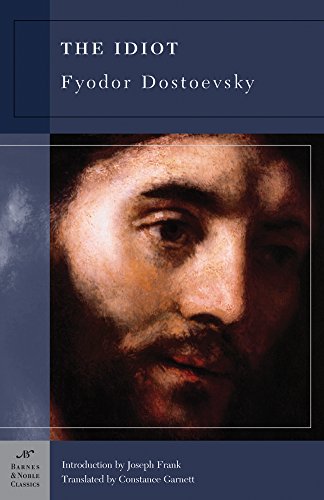The Idiot (Barnes & Noble Classics)
Fyodor Dostoevsky
BOOK REVIEW

The Idiot is not merely a story; it is an exploration of the human soul cloaked in the intricacies of a world that often fails the innocent. Dostoevsky's narrative dives deep into the psyche of Prince Myshkin, a character whose purity and compassion clash violently against the backdrop of a society steeped in hypocrisy and moral decay. 🌀
Upon his return to Russia after a long stay in a Swiss sanatorium, Myshkin serves as a canvas onto which the desires, dreams, and disillusionments of those around him are projected. With the heart of a saint and the innocence of a child, he wades into the murky waters of social dynamics, inadvertently creating ripples of chaos among the people he meets. Readers find themselves drawn into a turbulent landscape where every act of kindness is tested, every ounce of sincerity buried beneath layers of jealousy, lust, and betrayal.
It's easy to dismiss Myshkin as simply naive; his inability to navigate the manipulations that box him in creates a sense of dread for the reader as they bear witness to his downfall. The emotional investment is palpable, igniting strong feelings of compassion and frustration. What happens when a true-hearted individual encounters the brutal reality of human nature? Dostoevsky crafts a narrative that answers this question in heart-wrenching detail.
Dostoevsky himself was a product of the tumultuous 19th-century Russia, a time marked by philosophical upheaval, class struggles, and the emergence of existential thought. His own life experiences - imprisonment, exile, and an enduring battle with mental health - fuel the raw emotion found within The Idiot. This context deepens the connection to Myshkin's journey; the prince embodies the struggle between enlightenment and the moral ambiguity of society, reflecting Dostoevsky's view on the human condition. ✨️
Although some readers hail the novel as a masterpiece, others criticize its length and pacing, feeling that the intricate philosophical discussions and character explorations can weigh down the plot. Yet, isn't it this very complexity that challenges us to grapple with our own perceptions of good, evil, and the gray areas in between? Many argue that this sprawling tale of relational turmoil and spiritual questions is a profound commentary on the moral crisis of the contemporary world.
The character of Myshkin stands in stark contrast to the ambitious and calculating personalities around him, like the alluring Nastasya Filippovna and the manipulative Rogozhin. Their interactions form a tragic tapestry that pulls the reader into a whirlpool of emotions - a blend of despair, hope, and longing that resonates with universality. Could anyone truly remain unscathed by the chaos born from fervent desire and betrayal? 🤯
From its philosophical underpinnings to its rich character development, The Idiot has echoed through the ages, influencing writers, thinkers, and artists. The likes of Jean-Paul Sartre and Sigmund Freud have drawn inspiration from Dostoevsky's themes of existential conflict, illuminating the novel's impact on literature and psychology alike. This raises the stakes - if such profound thinkers grapple with the questions posed by Dostoevsky, isn't it crucial for us to lean in and confront our own discomfort?
As Myshkin's story unfolds, you're left with a haunting question: at what cost does innocence exist in a flawed world? Through a combination of drama, passion, and philosophical exploration, Dostoevsky compels you to reflect, to feel, and ultimately, to reconsider your understanding of humanity. It's an invitation to stride alongside a prince whose light may burn too bright for the shadows surrounding him.
So here you are, charged with the weight of The Idiot. Will you rise to the occasion, feeling the heat of this spiraling narrative? In a world increasingly defined by its moral complexities, can the lessons of compassion, empathy, and self-awareness taught by Dostoevsky resonate within the fabric of today's society? Dive deep, and you might just find the answers that echo across the ages. 🌌
📖 The Idiot (Barnes & Noble Classics)
✍ by Fyodor Dostoevsky
🧾 608 pages
2005
#idiot #barnes #noble #classics #fyodor #dostoevsky #FyodorDostoevsky